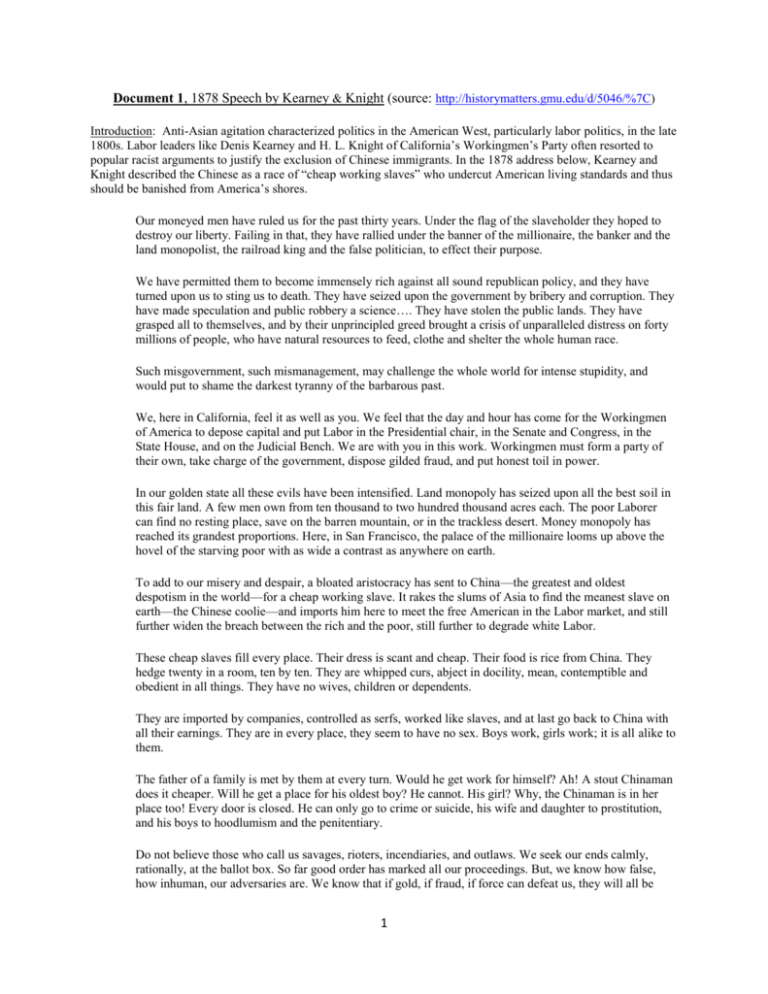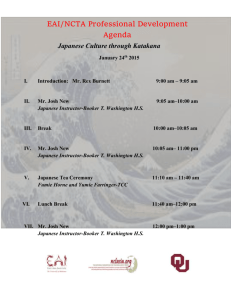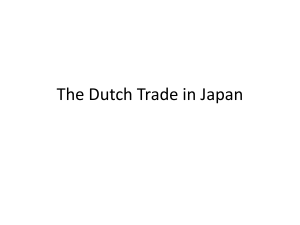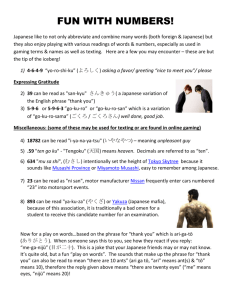Document 1, 1878 Speech by Kearney & Knight (source: http
advertisement

Document 1, 1878 Speech by Kearney & Knight (source: http://historymatters.gmu.edu/d/5046/%7C) Introduction: Anti-Asian agitation characterized politics in the American West, particularly labor politics, in the late 1800s. Labor leaders like Denis Kearney and H. L. Knight of California’s Workingmen’s Party often resorted to popular racist arguments to justify the exclusion of Chinese immigrants. In the 1878 address below, Kearney and Knight described the Chinese as a race of “cheap working slaves” who undercut American living standards and thus should be banished from America’s shores. Our moneyed men have ruled us for the past thirty years. Under the flag of the slaveholder they hoped to destroy our liberty. Failing in that, they have rallied under the banner of the millionaire, the banker and the land monopolist, the railroad king and the false politician, to effect their purpose. We have permitted them to become immensely rich against all sound republican policy, and they have turned upon us to sting us to death. They have seized upon the government by bribery and corruption. They have made speculation and public robbery a science…. They have stolen the public lands. They have grasped all to themselves, and by their unprincipled greed brought a crisis of unparalleled distress on forty millions of people, who have natural resources to feed, clothe and shelter the whole human race. Such misgovernment, such mismanagement, may challenge the whole world for intense stupidity, and would put to shame the darkest tyranny of the barbarous past. We, here in California, feel it as well as you. We feel that the day and hour has come for the Workingmen of America to depose capital and put Labor in the Presidential chair, in the Senate and Congress, in the State House, and on the Judicial Bench. We are with you in this work. Workingmen must form a party of their own, take charge of the government, dispose gilded fraud, and put honest toil in power. In our golden state all these evils have been intensified. Land monopoly has seized upon all the best soil in this fair land. A few men own from ten thousand to two hundred thousand acres each. The poor Laborer can find no resting place, save on the barren mountain, or in the trackless desert. Money monopoly has reached its grandest proportions. Here, in San Francisco, the palace of the millionaire looms up above the hovel of the starving poor with as wide a contrast as anywhere on earth. To add to our misery and despair, a bloated aristocracy has sent to China—the greatest and oldest despotism in the world—for a cheap working slave. It rakes the slums of Asia to find the meanest slave on earth—the Chinese coolie—and imports him here to meet the free American in the Labor market, and still further widen the breach between the rich and the poor, still further to degrade white Labor. These cheap slaves fill every place. Their dress is scant and cheap. Their food is rice from China. They hedge twenty in a room, ten by ten. They are whipped curs, abject in docility, mean, contemptible and obedient in all things. They have no wives, children or dependents. They are imported by companies, controlled as serfs, worked like slaves, and at last go back to China with all their earnings. They are in every place, they seem to have no sex. Boys work, girls work; it is all alike to them. The father of a family is met by them at every turn. Would he get work for himself? Ah! A stout Chinaman does it cheaper. Will he get a place for his oldest boy? He cannot. His girl? Why, the Chinaman is in her place too! Every door is closed. He can only go to crime or suicide, his wife and daughter to prostitution, and his boys to hoodlumism and the penitentiary. Do not believe those who call us savages, rioters, incendiaries, and outlaws. We seek our ends calmly, rationally, at the ballot box. So far good order has marked all our proceedings. But, we know how false, how inhuman, our adversaries are. We know that if gold, if fraud, if force can defeat us, they will all be 1 used. And we have resolved that they shall not defeat us. We shall arm. We shall meet fraud and falsehood with defiance, and force with force, if need be. We are men, and propose to live like men in this free land, without the contamination of slave labor, or die like men, if need be, in asserting the rights of our race, our country, and our families. California must be all American or all Chinese. We are resolved that it shall be American, and are prepared to make it so. May we not rely upon your sympathy and assistance? With great respect for the Workingman’s Party of California. Dennis Kearney, President; H.L Knight, Secretary Document 2, 1900 Comments by Mayor of San Francisco (source: Personal Justice Denied: Report of the Commission on Wartime Relocation and Internment of Civilians (1982) http://www.nps.gov/history/history/online_books/personal_justice_denied/index.htm) Introduction: Following early incidents in the 1890's, anti-Japanese activity commenced in earnest in 1900. On May 7, 1900, local labor groups called a major anti-Japanese protest in San Francisco. Political, economic, and social arguments were made. Mayor James Duval Phelan of San Francisco expressed the prevalent feelings: The Japanese are starting the same tide of immigration which we thought we had checked twenty years ago. . . . The Chinese and Japanese are not bona fide citizens. They are not the stuff of which American citizens can be made. . . . Personally we have nothing against Japanese, but as they will not assimilate with us and their social life is so different from ours, let them keep at a respectful distance. [Quotes from San Francisco Examiner and San Francisco Chronicle, both for May 8, 1900, in Roger Daniels, The Politics of Prejudice (Berkeley: University of California Press, 1962), p. 21.] Document 3, 1906 Comments by the Asiatic Exclusion League (source: http://www.sfmuseum.net/1906.2/invasion.html. “…the … League has done wonderful work in educating the public. Thousands of … people … have learned the truth that the Japanese coolie is even a greater menace to the existence of the white race, to the progress and prosperity of our country than is the Chinese coolie.… As long as California is white man’s country, it will remain one of the grandest and best states in the union, but the moment the Golden State is subjected to an unlimited Asiatic coolie invasion there will be no more California.” Document 4, July 1911 Proceeding of the Asiatic Exclusion League (source: “The Asiatic Exclusion League Argues That Asians Cannot Be Assimilated, 1911,” in Major Problems in American Immigration History: Documents and Essays, 2nd Ed., by Mae Ngai and Jon Gjerde, (Boston, 2013), 314-316. These Asiatic immigrants are an unmitigated nuisance in every community in which they have settled. The Chinese were the first orientals to enter … and nearly forty years ago their presence in the Pacific coast states had produced conditions so demoralizing as to attract the attention of Congress and result in a law in 1882 excluding them…. But this law is not sufficiently strict…. Don’t be deceived by any delusive hope that the yellow race can possibly become amalgamated with the white race in this country through intermarriage. The very thought is preposterous and revolting in view of their physical, mental and moral differences,… Nor in any true sense will they ever become Americanized. For profit or convenience a few do, and in course of time more of them may adopt our style of dress,.., but the essential characteristics which 2 distinguish their mode of life, their ideals, religion, morals and aspirations individually and as a race [,] they adhere to most tenaciously…. But their ways are not as our ways and their gods are not as our God, and never will be…. We need hardly mention the destructive effect of Chinese cheap labor in driving out white labor…. We have spoken mostly about the Chinese as they largely outnumber the Japanese and Hindus in this country. But the Japanese are already settled in sufficient number in the Pacific coast states to be a nuisance and a menace and the Hindus have begun to come. The Japanese are even more objectionable than the Chinese because sharper [sic], and reputed to be more tricky and unscrupulous, while they are much more aggressive and warlike…. We have no law to prohibit Japanese and Hindu immigration, nothing but an unwritten understanding that the Japanese government is to discourage its subjects from emigrating to the United States. Document 5, February 13, 1942 Editorial Cartoon by Dr. Seuss (Theodor Seuss Geisel) in New York newspaper PM (source: http://libraries.ucsd.edu/speccoll/dspolitic/Frame.htm under February 1942) Introduction: Theodor Seuss Geisel drew over 400 editorial cartoons during his time as chief editorial cartoonist for PM from 1940 to 1948. Document 6, Lt. General John DeWitt's Attitude toward people of Japanese ancestry in early 1942 (source: Personal Justice Denied: Report of the Commission on Wartime Relocation and Internment of Civilians (1982) http://www.nps.gov/history/history/online_books/personal_justice_denied/index.htm) Introduction: While recommending to Secretary of War Henry Stimson the removal from the West Coast of both Japanese immigrants as well as their descendants born in the United States, DeWitt stated: In the war in which we are now engaged racial affinities are not severed by migration. The Japanese race is an enemy race and while many second and third generation Japanese born on United States soil, possessed 3 of United States citizenship, have become "Americanized," the racial strains are undiluted. To conclude otherwise is to expect that children born of white parents on Japanese soil sever all racial affinity and become loyal Japanese subjects, ready to fight and, if necessary, to die for Japan in a war against the nation of their parents. That Japan is allied with Germany and Italy in this struggle is no ground for assuming that any Japanese, barred from assimilation by convention as he is, though born and raised in the United States, will not turn against this nation when the final test of loyalty comes. It, therefore, follows that along the vital Pacific Coast over 112,000 potential enemies, of Japanese extraction, are at large today. J. L. DeWitt, Final Report: Japanese Evacuation From the West Coast, 1942 (Washington, DC: U.S. Government Printing Office, 1943), p. 34. Document 7, Lt. General John DeWitt on Japanese Americans, April 13 & 14, 1943 (sources: DeWitt’s testimony on April 13, 1943, in San Francisco before the House Naval Affairs Subcommittee to Investigate Congested Areas, Part 3, pp. 739-40 (78th Cong ., 1st Sess.): cited in Korematsu v. United States, footnote 2, reproduced at findlaw.com http://caselaw.lp.findlaw.com/scripts/getcase.pl?court=US&vol=323&invol=214#fff1; and Personal Justice Denied: Report of the Commission on Wartime Relocation and Internment of Civilians (1982) http://www.nps.gov/history/history/online_books/personal_justice_denied/index.htm) Introduction: In 1943 before a Congressional committee, discussing his exclusionary policy, DeWitt reiterated his views: Gen. DeWitt: . . . I don't want any of them (persons of Japanese ancestry) here. They are a dangerous element. There is no way to determine their loyalty. The west coast contains too many vital installations essential to the defense of the country to allow any Japanese on this coast.... I have the mission of defending this coast and securing vital installations. The danger of the Japanese was, and is now,—if they are permitted to come back—espionage and sabotage. It makes no difference whether he is an American citizen, he is still a Japanese. American citizenship does not necessarily determine loyalty. Mr. Bates: You draw a distinction then between Japanese and Italians and Germans? We have a great number of Italians and Germans and we think they are fine citizens. There may be exceptions. Gen. DeWitt: You needn't worry about the Italians at all except in certain cases. Also, the same for the Germans except in individual cases. But we must worry about the Japanese all the time until he is wiped off the map. Sabotage and espionage will make problems as long as he is allowed in this area—problems which I don't want to have to worry about. Testimony before House Naval Affairs Subcommittee, April 13, 1943. NARS. RG 338 (CWRIC 1725-28). The General made the point again the next day (April 14, 1943) in an off-the-record press conference. DeWitt condensed his opinion of a policy he had opposed, allowing American soldiers of Japanese ancestry into the excluded areas, by telling the reporters that "a Jap is a Jap." Transcript of conference, DeWitt and newspapermen, April 14, 1943. NARS. RG 338 (CWRIC 26565). Document 8, Mr. Austin E. Anson, Managing Secretary of the Salinas Vegetable Grower-Shipper Association on Economic Reasons for White Anger @ Japanese Americans (source: Korematsu v. United States (1944) footnote #12 http://www.law.cornell.edu/supct/html/historics/USSC_CR_0323_0214_ZD1.html) Anson made the comments below in Frank J. Taylor’s article "The People Nobody Wants," Saturday Evening Post (May 9, 1942). We're charged with wanting to get rid of the Japs for selfish reasons. . . . We do. It's a question of whether the white man lives on the Pacific Coast or the brown men. They came into this valley to work, and they stayed to take over. . . . They undersell the white man in the markets. . . . They work their women and children while the white farmer has to pay wages for his help. If all the Japs were removed tomorrow, we'd never miss them in two weeks, because the white farmers can take over and produce everything the Jap grows. And we don't want them back when the war ends, either. 4








